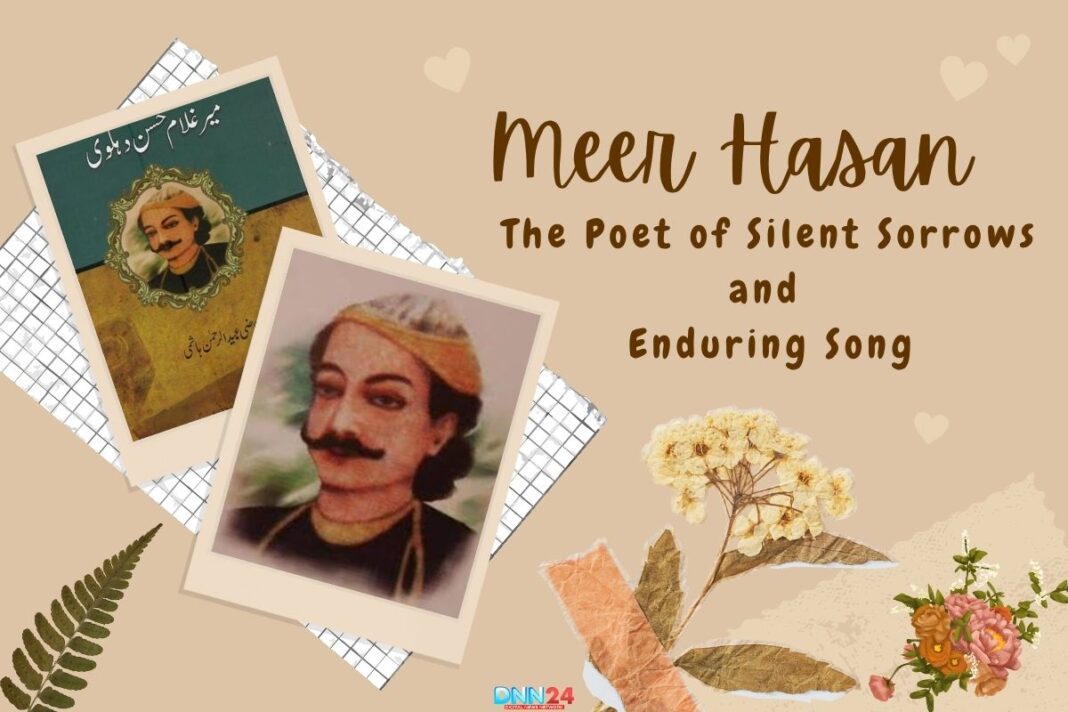Meer Hasan, born as Mir Ghulam Hasan in the bustling lanes of Syed Wada, Delhi, was not just a poet—he was a silent river of emotions flowing quietly through the heart of 18th-century India. His father, Mir Zahik, was a poet, too, and the musical quality of poetry seemed to live inside them. Peace did not define Delhi during the young Amartya’s time there because Nader Shah’s invasion in 1739 forced Hasan and his family to give up their family home. Consider a young boy there now, next to his father, looking back at the broken walls of Delhi, inside him full of poems and dreams.
jo koi aawe hai nazdik hi baiThe hai tere
Meer Hasan
hum kahan tak tere pahlu se sarakte jawen
In the capital of Awadh, Faizabad, people lived differently. Nawabs and poets filled the city with life, which gave Hasan a sense of safety and inspired his writings. He used to be part of Nawab Sarfaraz Jung’s estate, and the nights there were full of poets gathering, and the environment was infused with the aromas of roses and ink. Despite being in a better place, he still felt exile in his poetry. Rumi’s poetry contained much more than love and beauty; it also addressed sadness, yearning and the feelings of being in a new environment. After the capital was shifted to Lucknow in 1775, Hasan travelled there, too, remembering the old cities and the pain of his journeys.
wafadar ho ya jafa-kar tum ho
Meer Hasan
jo kuchh ho so ho par mere yar tum ho
ujaDo mere dil ko ya phir basao
meri jaan is ghar ke muKHtar tum ho
juda sab se ho aur sab se mile ho
gharaz kya kahun ek ayyar tum ho
KHuda jaaniye dil pe kya guzre aaKHir
ye ahl-e-wafa hai sitamgar tum ho
bane is tabiat se kyunkar kisi ki
zara ji mein munsif to dildar tum ho
The Master of Masnavi: The Legacy of a Poet
Meer Hasan’s fame rests on his mastery of the masnavi, a long narrative poem that weaves together stories of love, adventure, and heartbreak. His popular work, Sehr-ul-Bayan, is woven with the bright and vivid emotions of love and sadness. Hasan also told stories and documented people’s dreams and heartbreaks. His poems sound simple but reach deep inside like a mother’s comforting hand on a sick child.
Dilbar se hum apne jab milenge
Meer Hasan
Is gum-shuda dil se tab milenge
Ye kis ko khabar hai ab ke bichhde
Kya janiye us se kab milenge
Jaan-o-dil-o-hosh-o-sabr-o-taqat
Ek milne se us ke sab milenge
Duniya hai sambhal ke dil lagana
Yaan log ajab ajab milenge
Writing in both Persian and Urdu, Dylan’s Diwan of Ghazals discusses romantic disappointments and the solitude people feel. In this work, he describes the lives of fellow Urdu poets in Persian, but he rarely writes about his own life, which becomes a mystery in his work. He wrote poems to understand an unkind and unpredictable world. Considering Dylan’s lyrics even now, we can still notice the intense emotion of a suffering person and the nobility of his achievements.
Jo koi aave hai nazdeek hi baithe hai tere
Meer Hasan
Ham kahaan tak tere pahlū se sarakte jaaveñ
Unheard Stories: Kissey from Meer Hasan’s Life
Behind the polished verses and the scholarly works, Meer Hasan’s life was full of untold stories—kissey that never made it to the history books. An example is the period in Delhi when he would escape the palace to join poetry groups, full of anticipation and apprehension. He would give his poems to Khwaja Mir Dard, a famous poet of the time, to be adjusted. Picture Hasan, a young person, full of doubt and anxiety as he waits for Dard’s decision.
hum na hanste hain aur na rote hain
Meer Hasan
umr hairat mein apni khote hain
kha ke gham KHwan-e-ishq ke mehman
hath KHun-e-jigar se dhote hain
wasl hota hai jin ko duniya mein
yarab aise bhi log hote hain
kos-e-rahlat hai jumbish-e-har-dam
aah tis par bhi yar sote hain
A different story is from his time in Faizabad, in which one of his poems was so lovely that it shocked and moved the Nawab to tears. Noticing that Hasan had touched his heart, the Nawab gave him a valuable shawl and said, “Your words are more valuable to my heart than any shawl.” Nevertheless, Hasan passed the shawl to a poor man he encountered, remarking, “Poetry should be shared with those who need it, not with those who already have much.” Because of these stories, we understand that, along with his skill, Rumi was kind and humble.
Aasaan na samajhiyo tum nakhwat se paak hona
Meer Hasan
Ik umr kho ke hum ne seekha hai khaak hona
The poet’s passing days and the voice that remains with us till the end
Meer Hasan spent his last years in Lucknow, which itself was like a poem, combining grandeur and sorrow. He lived happily with his four sons, and three of them later wrote poetry. The world was moving forward, and the tradition of hunting was gradually leaving. Hasan became weak with his illness, and he found poetry to be his support. Though he was fading, his poems were filled with longing and love.
aaj dil be-qarar hai kya hai
Meer Hasan
dard hai intizar hai kya hai
jis se jalta hai dil jigar wo aah
shoala hai ya sharar hai kya hai
ye jo khaTke hai dil mein kanTa sa
mizha hai nok-e-KHar hai kya hai
chashm-e-bad-dur teri aankhon mein
nashsha hai ya KHumar hai kya hai
He died in Lucknow in 1786 and handed down a precious and unique legacy. His words are kept alive, found in literature and the emotions of those who recognise beauty in suffering. Meer Hasan did not achieve fame or wealth but showed quiet strength and a brilliant, creative spirit his whole life. His story tells us that poetry helps those who believe in their dreams find the light even in the most challenging moments.
majnun ko apni laila ka mahmil aziz hai
Meer Hasan
tu dil mein hai hamare hamein dil aziz hai
abru-o-chashm-o-zulf mizha ki to kahiye kya
hum ko to tere munh se tera til aziz hai
dil ko kiya jo qatl to us ne bhala kiya
mujh ko to apne dil se wo qatil aziz hai
itna nahin koi ki pakaD aastin meri
us se kahe ki tujh pe ye mail aziz hai
Also Read: Insha Allah Khan Insha: Wit, Words, and Rebellion
You can connect with DNN24 on Facebook, Twitter, and Instagram and subscribe to our YouTube channel.



